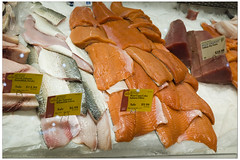
Well, the Food Police don't live anywhere else, thanks to years of budget cuts and staff shortfalls. Lest we forget, a bi-partisan choice. The nation's food factories are big businesses, and have big lobbying dollars to convince compliant Congress-critters that regulation is for suckers. But the constant news about consumers getting sick is bad for business some are realizing.
Food industries and regulators are advocating preventive action by companies as the best way to prevent food-borne illnesses.
But this system of "preventive controls" has worked in the past only with adequate regulatory enforcement and industry support -- neither of which is guaranteed.
"The reason you have regulation is some companies don't have the market incentive to meet high food-quality standards," said Mike Taylor, a food-safety expert who worked in the administrations of George H.W. Bush and Bill Clinton. "The public doesn't trust a system that leaves it entirely to the industry."
In recent years, the number of illnesses caused by foods regulated by the Food and Drug Administration -- including fresh produce and peanut butter -- has risen sharply, according to an analysis of government and medical-journal data by the Center for Science in the Public Interest, a consumer group in Washington.
[From Can Food Industry Police Itself?]

Poor, poor FDA, so overworked, and out-manned by circumstance. My heart aches for their tough job(and my stomach too).
A boom in food imports also hit the FDA much harder. The USDA regulates mostly U.S.-produced goods, with only 33 foreign countries allowed to ship meat to the U.S. through as many ports. The FDA, by contrast, has relatively little control over the 13,916 foreign seafood processors shipping into 400 U.S. ports -- when imports accounted for more than half of all seafood consumed in the U.S. in the late 1990s and 83% today.
The FDA in the late 1990s had planned to visit foreign countries to evaluate seafood-safety standards. But those plans were gradually abandoned due to costs and the challenges of dealing with myriad differing standards.
"The U.S. is flooded with an enormous volume of food from abroad, where the risks to food are greater than ever before, and at a time in which the FDA's ability to protect our food supply is growing even weaker," Mr. Hubbard said.
Now the industry is looking to strengthen regulation, including broadening the use of preventive controls. Apparently realizing that a weak FDA affects consumer confidence -- and their bottom line -- several trade groups, such as the GMA and National Fisheries Institute, are lobbying for more funding and authority for the agency to oversee food safety.
